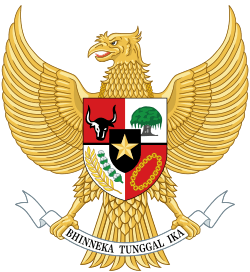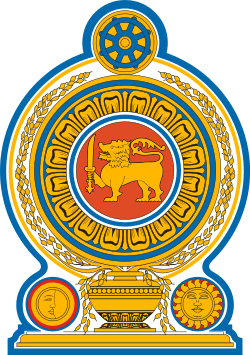Indonesia–Sri Lanka relations
 |
|
Indonesia |
Sri Lanka |
|---|---|
Indonesia–Sri Lanka relations refers to the bilateral relations of the nations of Indonesia and Sri Lanka. Both nations share some cultural similarities.[1] Indonesia and Sri Lanka are members of the World Trade Organization. They are founding members of the Non-Aligned Movement. The two nations established diplomatic relations in 1952. Indonesia has an embassy in Colombo, while Sri Lanka has an embassy in Jakarta.
Regarding the LTTE separatism in Sri Lanka, Indonesia has expressed their support on Sri Lankan territorial integrity and national unity. Indonesia also supports the national reconciliation process in Sri Lanka towards peace and stability.[2]
History
The relationship between the two nations began earlier in 5th century CE, marked by the coming of Hinduism and Buddhism influences from Indian subcontinent and Sri Lanka to Indonesian archipelago.[3] The Hindu-Buddhist kingdoms of ancient Indonesia and Sri Lanka nurtured contacts in the 9th to 12th century CE, during the era of the Srivijaya Empire. During this time, Buddhism was the principal religion of both nations. According to the Sri Lankan Ambassador to Indonesia, an Indonesian king visited Sri Lanka presented a baby elephant as a gift.[4]
The interactions between them grew in the 17th and 18th centuries, as both nations fell under the control of the Dutch East India Company (VOC). Sri Lanka was part of the VOC during Dutch period in Ceylon from 1656 to 1796. In the 17th-century, Indonesia was under the control of the Dutch East India Company as well as housing the headquarters for the VOC. It later became a Dutch colony in the Dutch East Indies until World War II. During 18th century, multiple of kings, princes, and warriors from Javanese Mataram, Madura and Sulawesi, who opposed to the Dutch rule of the Indonesian archipelago were exiled to Sri Lanka. The descendants of Indonesian exiles has created the Indonesian—Malay community in Sri Lanka that can trace their ancestry to Java, Madura and Sulawesi. For example, a warrior who fought for Kandy Kingdom named Karaeng Sangunglo was a Bugis nobleman.[1]
Indonesia and Sri Lanka officially established diplomatic relations on 2 August 1952. The relations grow further in 1955, when Indonesia and Sri Lanka, together with India, Pakistan and Burma initiated the Bandung Conference.[3] Since 1962, the status of the Indonesian Consulate office in Colombia has been upgraded as an Embassy. The office has also served as the Indonesian representative office for Maldives as of 2 September 1975.
Economy and trade
The Sri Lanka-Indonesia Business Council was established on August 30, 1991, with the main objective of promoting bilateral trade, investment, and tourism.[4]
Since 2012, both nations have agreed on increasing bilateral cooperation sectors including defense, culture, agriculture and aquaculture.
Culture
In April 2013, Indonesia and Sri Lanka commemorated the 60th anniversary of diplomatic relations in Merdeka Building, Bandung, to remember Asian–African Conference, the historic event that brought two nations closer together. This event is also marked with cultural collaboration of traditional puppet performance; Indonesian wayang golek with Sri Lankan ruukada.[1]
Notes
- 1 2 3 "60 Tahun Hubungan Indonesia-Sri Lanka: Bersahabat dalam Politik, Ekonomi dan Sosial Budaya" (in Indonesian). Ministry of Foreign Affairs of Indonesia. April 28, 2013. Retrieved May 19, 2014.
- ↑ "Indonesia Tegaskan Dukungan atas Keutuhan Wilayah Sri Lanka" (in Indonesian). The Global Review. 9 December 2011. Retrieved May 19, 2014.
- 1 2 "Hubungan Indonesia-Sri Lanka Terjalin Sejak Abad Lima" (in Indonesian). Rakyat Merdeka online. April 27, 2013. Retrieved May 19, 2014.
- 1 2 Alexander Hamer (February 5, 2013). "Sri Lanka confident of increased ties with RI". The Jakarta Post. Retrieved 4 June 2013.
External links
- The Embassy of Republic of Indonesia in Colombo, Sri Lanka
- The Embassy of Sri Lanka in Jakarta, Indonesia

